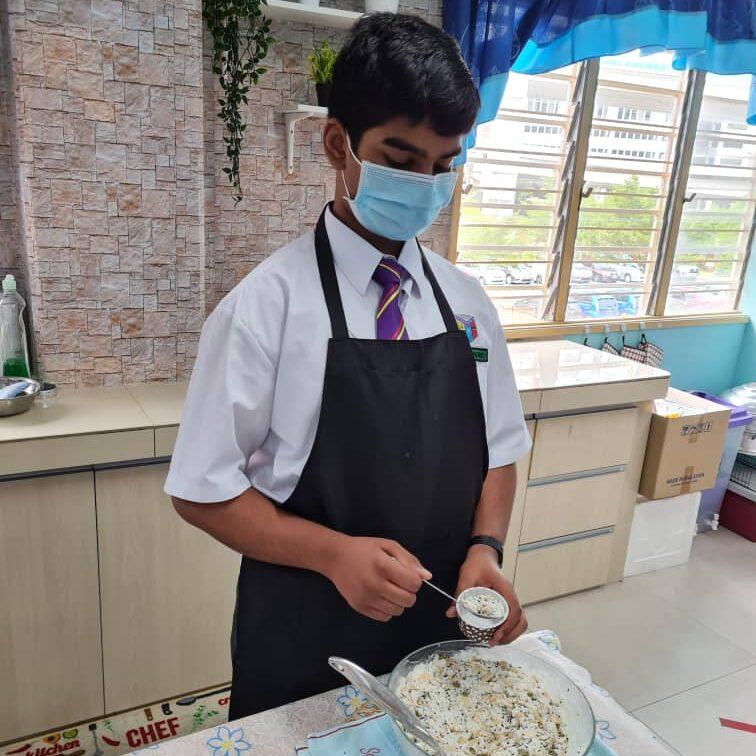The journey of parenting is a roller coaster ride consisting of the joys of nurturing and the challenges of raising a happy and healthy child that will eventually grow into an adult. Often, it’s not a smooth sailing journey, riddled with challenges and uncertainties. Yet, somehow parents find a way to make it work.
However, the journey of parenthood is not similar for everyone. There is no foolproof formula that guarantees flying colours when it comes to parenting. Many factors come into play when raising a child.
When discussing the diversity in parenting journeys, parenthood may look different when parenting a child with special needs. To share more on this journey, we’ve gotten in touch with Richard and Catherine who are parents to a creative and bright boy, Ernest. In this heartwarming and inspirational interview, Richard and Catherine share their journey in raising a special needs child, the challenges that they went through, and how as a family unit, they grew stronger.

1Twenty80:COULD YOU TELL US A LITTLE BIT ABOUT ERNEST?
Richard & Catherine: Ernest Richard is 15 years old now. He likes to draw and he loves to talk. He’s very inquisitive and curious about everything. Because of his curious nature, he likes to ask a lot of questions.
He also loves cars and he likes to learn about electronic things. When we’re on the road, if he sees something that catches his attention, he loves to talk about it.
Ernest is currently in Form Two and he’s attending government school whilst also taking up special classes in a private special needs facility. We’re also sending him to other academic classes. On the weekends, Ernest goes to art classes. We want him to learn something based on his passion.

1Twenty80:WHAT ARE THE CHALLENGES THAT COME WITH RAISING A CHILD WITH SPECIAL NEEDS?
Richard & Catherine: The first thing that comes to our mind is the word patience. It’s imperative to be patient when raising a special needs child. Our son is diagnosed with mild autism and the challenges we experienced since Day One were tough. The day that we found out Ernest had autism, as parents, it was a very stressful time in our lives.
Knowing that he’s going to be like this for the rest of his life, we thought to ourselves: How are we going to raise him? Upon his diagnosis, we weren’t aware of the challenges that come with raising a special needs child. In the beginning, we were blank. We did not know what steps to take next upon finding out about our son’s condition.
We spoke to people and we did some readings for us to develop a deeper understanding of our son’s condition and to better learn how we can help him.
So, to answer your question, the first challenge we experienced was ‘We don’t know’, meaning we didn’t know how to raise a special needs child.
The stress from feelings like these, it’s very hard to describe.
We’re still learning and growing today.
1Twenty80:HOW BIG OF AN IMPACT DOES FINANCE PLAY IN YOUR JOURNEY OF RAISING A SPECIAL NEEDS CHILD?
Richard & Catherine: Finance is a big area of concern for us. Sending kids to special needs classes can be really expensive and it’s not something every parent can afford.
If you want to send a special needs child for special education, it’s really costly. This is because their education is specifically tailored for the child and this requires a different skill set. Teachers who teach special needs kids are trained professionally as well in this area. We’re thankful that we can afford to send Ernest to special classes. However, we also worry about other parents who may not have the same ability as us.
1Twenty80:HOW DO YOU MAINTAIN SELF-CARE WHILE CARING FOR A SPECIAL NEEDS CHILD?
Richard & Catherine: Both of us, as husband and wife, and parents, help and support each other when it comes to caring for Ernest.
Our kids (Ernest’s older siblings) also help us a lot when it comes to looking after Ernest and they spend a lot of time with Ernest when we’re not around. During tough situations, we get support from our extended families. Our family is very understanding and they are accommodating with Ernest, especially
when Ernest is dealing with temper tantrums.
Ernest also has really good teachers who help guide and teach him. The church community that we are a part of also helped us in our times of need.

We would also like to highlight that it’s important to identify and understand the child’s condition. The severity of the condition can impact the parents’ stress levels as well. Circumstances can differ and be impacted based on the child’s condition. Every parent’s journey with a special needs child is different and unique.
1Twenty80:HOW DO YOU HELP YOUR CHILD NAVIGATE THROUGH SOCIAL CHALLENGES?
Richard & Catherine: Ernest gets involved in a lot of programmes at his school. The school occasionally organises out-of-school activities. This helps him to meet and interact with people from all walks of life. For example, a few years back, he went to Langkawi by flight and this was a school organised trip. There was even a trip where he stayed overnight at a paddy field located in Sekinchan.
We want him to get exposure and we try to let him go as much as we can. Ernest always has the people with the right kind of expertise to guide him when he’s involved in programmes or activities.
As parents, we also take him out to public areas so he gets to acclimate and be involved in social interactions. If Ernest experienced some challenges while he is in a public setting, upon returning home, we explain to Ernest what he did well and what he can improve on in terms of his behaviour and actions. We do these reflections so that he doesn’t repeat the same mistakes in the future. Usually, he listens, understands, and is able to follow the things that we discuss during reflections.
We also give Ernest a heads-up before heading to a crowded or public area. This enables us to explain to him the dos and don’ts. Sometimes, he does forget instructions, and here’s where Ernest’s siblings step in and try to help guide him as much as they can.
1Twenty80:DOES SPECIAL EDUCATION PLAY AN IMPORTANT ROLE IN YOUR CHILD’S LIFE?
Richard & Catherine: Definitely! Ernest’s education in the government school and private school is different compared to the mainstream classes. He learns cooking, how to manage one’s self in terms of hygiene, and carry out daily activities such as ironing clothes and preparing the bed.
Occupational therapy is also something that he learns. He learns key skills like how to write and the right way to hold a pencil. Special education is important because it helps Ernest learn very specific things. Things that may come easily for us, may not come as easy for special kids. This is where special education plays a key role.
WE WOULD ALSO LIKE TO HIGHLIGHT THAT IT’S IMPORTANT TO IDENTIFY AND UNDERSTAND THE CHILD’S CONDITION. THE SEVERITY OF THE CONDITION CAN IMPACT THE PARENTS’ STRESS LEVELS AS WELL.
1Twenty80:WERE THERE TIMES WHEN YOU FELT HELPLESS IN YOUR JOURNEY RAISING A SPECIAL NEEDS CHILD?
Richard & Catherine: In the beginning, we were extremely worried because we didn’t know what we were supposed to do, how we were going to raise him and what was going to happen to Ernest. When we initially found out about Ernest’s condition, Ernest wasn’t able to communicate and he didn’t make eye contact.
He only started communicating at the age of 7 years old. It started with baby talk and eye contact was still a challenge. Ernest likes to talk to me (his mother) by holding my chin. We have to maintain close contact when talking to him.
When Ernest was a child, he was playing alone most of the time and didn’t talk to anybody. This made us worried. It was our paediatric doctor who recommended we enrol Ernest in a class at the age of 3 years old, to observe his development. When Ernest turned 4 years old, the signs were obvious and we then approached The National Autism Society of Malaysia (NASOM) to get Ernest diagnosed.
During the process at NASOM, we had to do things like fill up a questionnaire and bring Ernest in for observations. We got to know about NASOM through our doctor and through NASOM, we were slowly guided to other facilities where we got to meet other experts for regular check-ups.


1Twenty80:WHAT IS SOMETHING THAT YOU FEEL IS NOT REALLY SPOKEN ABOUT WHEN RAISING A SPECIAL NEEDS CHILD?
Richard & Catherine: Specialised education is really important for kids like Ernest and if possible, special education should begin at a really young age so that they get to grasp essential skills and concepts before it’s too late.
Understanding and learning start at a really early age and it’s imperative that parents seize this window to ensure that their child gets to grasp key skills. Starting special education at a young age also enables the child to acclimate gradually to the change in schedules and daily activities.
We are concerned that if special education started at a later age, the child may not be able to keep up as they are used to the relaxed schedule, prior to being enrolled.
Parents should also be aware of their child’s development and take immediate measures if they feel something is amiss. For example, if a child isn’t communicating by the age of two or three years old, parents should consult a doctor just as a precautionary method to understand better.
SPECIALISED EDUCATION IS REALLY IMPORTANT FOR KIDS LIKE ERNEST AND IF POSSIBLE, SPECIAL EDUCATION SHOULD BEGIN AT A REALLY YOUNG AGE SO THAT THEY GET TO GRASP ESSENTIAL SKILLS AND CONCEPTS BEFORE IT’S TOO LATE.
1Twenty80:WHAT ARE THE PLATFORMS YOU REFER TO, TO KNOW MORE ABOUT THE SERVICES FOR SPECIAL NEEDS KIDS?
Richard & Catherine: We attend talks and conferences that focus on how to raise a special needs child. This helps us learn ways we can better communicate with Ernest and identify activities that can benefit him as well.
We also ask around by talking to experts like doctors and also parents who share a similar journey as us. The government and private schools that Ernest goes to have also helped us. The teachers there help tell us the things we should do in regards to documentation and activities for Ernest.
We also read extensively to understand Ernest’s condition and how we can better help him across many areas of life. Essentially, we figure this out as we go and talk to people with who we cross paths.
1Twenty80:DO YOU HAVE ANYTHING YOU WISH TO SHARE WITH PARENTS OR CARETAKERS WHO ARE ON A SIMILAR JOURNEY AS YOU?
Richard & Catherine: Teamwork between parents and caretakers is extremely important. Sometimes, one person may be feeling morally down and it’s important for the significant other to support them. When met with a slump, it’s important that we have each other.
We want to stress that it’s also important that parents should accept their child’s condition if their child is diagnosed as a special child. There are some parents that refuse to accept their child’s condition and as a result of that, they don’t put their child in a special school. They insist their child go to a normal school and sometimes the child gets left behind in school as their studies are not tailored for them. This can be demotivating for the child.

Richard: My wife supports me when I’m feeling stressed and unmotivated. She is there with me throughout the whole time and I really appreciate her for this. She constantly motivates me and I am very appreciative of that.
We hope that this conversation has given you a more comprehensive understanding of what is frequently described as an isolated journey. Richard and Catherine showed us the importance of family and community support in their endeavour to raise Ernest. In light of this, we all hope to have the chance, whenever it arises, to assist those who are travelling in a similar journey as Richard and Catherine.
TEAMWORK BETWEEN PARENTS AND CARETAKERS IS EXTREMELY IMPORTANT. SOMETIMES, ONE PERSON MAY BE FEELING MORALLY DOWN AND IT’S IMPORTANT FOR THE SIGNIFICANT OTHER TO SUPPORT THEM.
|
If you’re a parent of a special needs child and you’re looking for places that can help guide you, below are some of the platforms that were helpful for Richard & Catherine The National Autism Society of Malaysia (NASOM) Child Development Centre HUKM |














